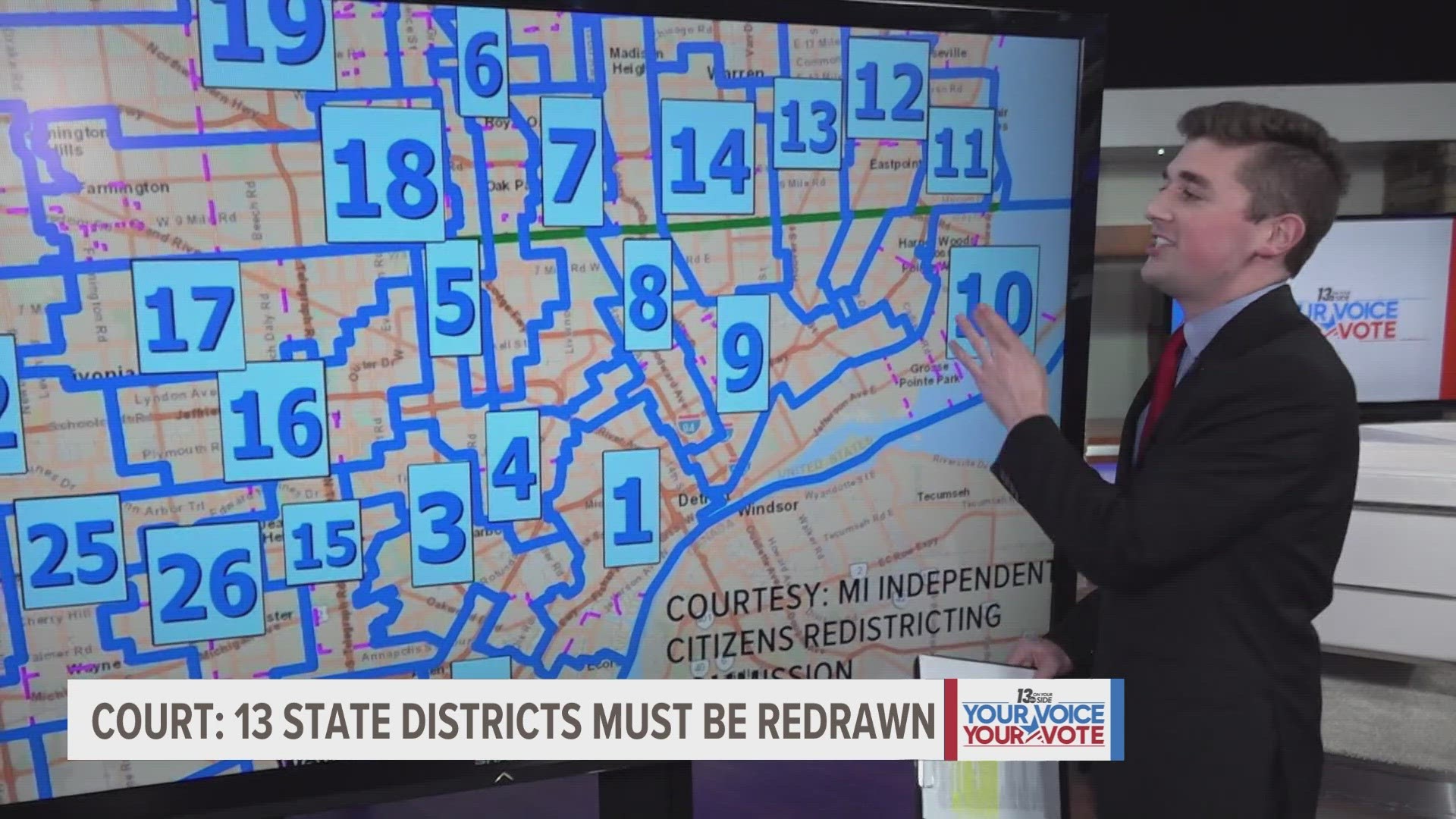GRAND RAPIDS, Mich — On Tuesday, the Michigan Department of State moved to appoint three new commissioners to the Michigan Independent Citizens Redistricting Commission (MICRC) - the group created by a 2018 statewide proposal that eventually redrew the state's electoral maps in 2021.
In a random drawing from a pool of applicants, Elaine Andrade, Donna Callaghan and Marcus Muldoon were selected to replace three outgoing commissioners.
With the commission's fixed balance of four Democratic commissioners, four Republican commissioners and five Independent commissioners when fully staffed, Andrade and Callaghan were selected to replace the two outgoing Democrats, and Muldoon was selected to replace the outgoing Republican.
But as the commission is now welcoming new citizens to its ranks, they've also been plagued by the success of a lawsuit in federal court challenging their work.
The lawsuit from a group of voters, filed against Secretary of State Jocelyn Benson as the head of the department that encompasses the MICRC, argued that some of the districts that the commission drew in and around Detroit underrepresented Black voters.
In their ruling, the three-judge panel ordered in late December that 13 state House and Senate districts in the Detroit area - all currently held by Democrats - be redrawn. In their written opinion, they said the districts violated the Equal Protection Clause of the U.S. Constitution.
"The record here shows overwhelmingly—indeed, inescapably—that the Commission drew the boundaries of plaintiffs’ districts predominantly on the basis of race," the court's opinion reads.
The court also faulted experts hired by the commission to guide their work by giving commissioners inadequate advice when considering the proportion of Black voters that should be apportioned to each district in the area.
"Yet these experts told the commissioners again and again - based on general-election data alone - that black-preferred candidates would 'perform well' in these districts," the court's opinion reads. "That was a grave disservice to everyone involved with this case, above all the voters themselves."
While state senators will not be up for re-election until 2026, a current tie in the state House - 54 Democrats to 54 Republicans, with 2 vacant seats in what are considered heavily Democratic districts - means there will be no room for error for either party as they seek to either keep or gain a majority in the chamber.
Should Democrats prevail in retaking the two open seats in special elections set for April, they would need to hold every seat being redrawn in order to keep their House majority.
Conversely, Republicans would only need to pick up one of the altered seats to tie the House and disrupt Democratic control in Lansing. Only two Republican pickups would be needed to grant them the House majority.
"It is a critical decision, these lines are critical how they're drawn," said Doug Koopman, a political science professor at Calvin University. "If they are redrawn more compactly and more square and rather than less long-shaped like they are, you could imagine a Republican gain in the state house and a Republican gain in the state Senate. And given how close the state legislature is, yeah, you could imagine that the control of the state legislature would depend on these lines."
With the complex, intertwining nature of redistricting, the redrawing of the court's mandated districts could result in other surrounding districts having their borders changed as well.
"There are probably three or four state House districts in the area that might be modified a little bit," Koopman said. "And you could see the same thing in the Senate, you know, two or three state Senate districts that might be slightly modified. And so, probably you're talking 20 to 22 districts that'll change a little bit."
►Make it easy to keep up to date with more stories like this. Download the 13 ON YOUR SIDE app now.
Have a news tip? Email news@13onyourside.com, visit our Facebook page or Twitter. Subscribe to our YouTube channel.
Watch 13 ON YOUR SIDE for free on Roku, Amazon Fire TV Stick, Apple TV and on your phone.

